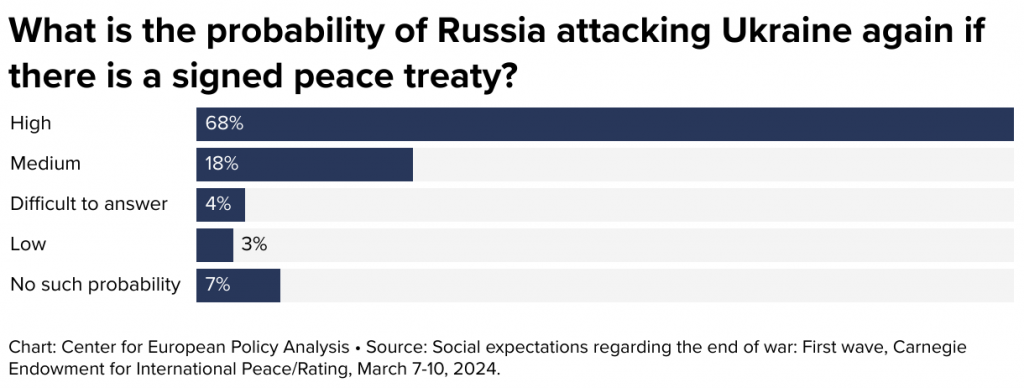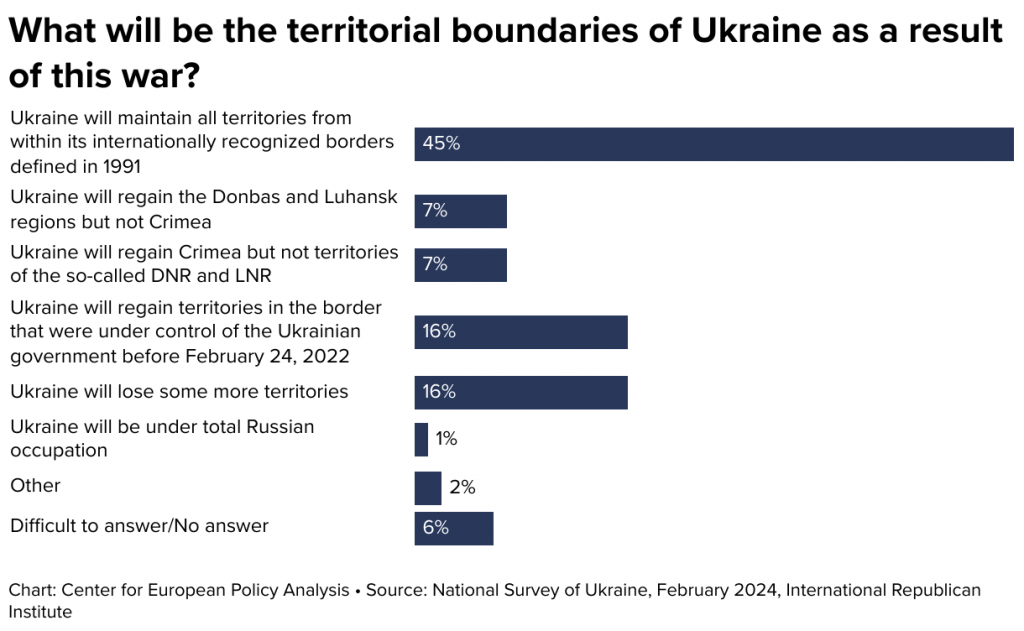Dig into the detail of opinion surveys and Ukrainians are surprisingly clear on what they want. Foreigners with simple solutions need to listen.
What do Ukrainians want? It’s a question too seldom asked, and it matters because whatever Americans, West Europeans, or even Russians might hope for, the decision on the future of any nation-state belongs to its people.
It may be hard for the negotiate-at-all-costs pundits who argue that a “realistic” assessment must prevail (where realism means the surrender of land for peace with no guarantees that Russia won’t renew its aggression), but the Ukrainian people are, in fact, optimistic and willing to continue the fight.
And that complicates any calculation about the future. Because the national sentiment is clear and deeply rooted.
How do we know? Ukrainians are constantly polled both by their own companies and by foreign groups. A February survey by the International Republican Institute (IRI) and a March poll by the Carnegie Endowment taken just after the Ukrainian withdrawal from Avdiivka show a remarkably robust outlook.
The first survey showed 88% believing Ukraine would win the war, while the second found 71% wanting to fight on, with only 26% seeking a negotiated peace.
But what really stood out was the belief that regardless of any deal, Russia would merely pause its war of aggression. The Carnegie poll registered 86% saying Russia would break a peace agreement and launch another attack, so while many Ukrainians are willing (46%) for their country to enter talks, they have little faith in the outcome.

What terms should Ukraine seek? More than 90% of the Carnegie respondents want Russian troops withdrawn from Ukrainian territory. And while some would accept the loss of Crimea in return for peace, the IRI poll shows 75% expecting the return of at least some currently occupied territory.
Probably the most significant finding is the popular feeling about the Ukrainian leadership negotiating away Ukrainian land. Any such decision would cause very serious trouble with the electorate — 71% would demand a change of administration either immediately or at the following election. This is strongly felt — 51% say they would join peaceful protests opposing such a deal and more worryingly, 7% say they would take up arms.
Governments, especially those with genuine democracies, are not by their nature suicidal.
So agreeing to Vladimir Putin’s peace terms is an absolute non-starter. The idea that Ukraine’s government could accept his demands to accept not only the loss of territory already captured, but then gift more land, including big cities like Kherson that were liberated by force of arms last year, is truly ludicrous and would represent — for President Zelenskyy’s government — a life-threatening event.

Hungary’s Viktor Orbán has recently engaged in what he termed “peace” talks with Zelenskyy and Putin will likewise be disappointed. And so too would Donald Trump, who promised that on his return to office he would “solve” the war in 24 hours. He has not shared the details of this fix with the Ukrainians, but it would be impossible for them to agree anything close to what Putin wants.
So what if Trump announced such a deal, without Ukrainian agreement? The government could accept but (see above) only in the face of huge opposition from its own people. And that would raise the specter of significant unrest, potentially leading to a revolution similar that of 2013, when former pro-Russian president Viktor Yanukovych decided not to sign a political association and free trade agreement with the EU, opting instead for closer ties with Russia. Revolution followed.
It is hard to know what Trump promises. During last month’s presidential debate with President Biden, he was asked if he would accept Putin’s terms. He replied: “No, they’re not acceptable.” Which leaves open the question what he does find acceptable and why he makes no effort to spell it out.
What might happen if Ukraine rejected a deal agreed by Trump and Putin that offered a few nominal concessions to Ukraine? It could of course reject the terms and fight on. The outlook would become far, far bleaker without US aid, especially if a new US administration shut off all arms shipments.
On the other hand, Ukraine might well be supported by the European Union which (as is often forgotten) pledged another $54bn in aid to the Kyiv government in February and has repeatedly stated a commitment to its survival. Likewise the UK.
There is an alternative approach. Trump could follow the current administration in supporting Zelenskyy’s 10-point peace plan. These points include nuclear safety (with the de-occupation of the Zaporizhzhia nuclear power complex), food security, energy security, the release of all prisoners and deportees, the withdrawal of Russian troops from all temporarily occupied territories, punishment for war crimes, prevention of escalation (involving effective security guarantees), and confirmation of the war’s end.
The June peace summit in Switzerland saw 78 countries signing a declaration stating that Ukraine’s “territorial integrity” should be the basis for any peace agreement with Russia.
Is the world really ready to accept the alternative — the rearrangement of borders by dictators whenever they please?
Really?
